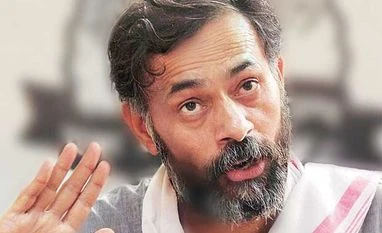Terming the decision to devalue high-denomination notes a "pseudo war" against black money, anti-corruption activist Yogendra Yadav criticised the government for seeking to dilute the Prevention of Corruption Act (PCA), saying this would weaken the actual battle against corruption and help the corrupt.
"The point we are trying to make is that it is pseudo war against black money. Not an actual war. It is a very small step in the larger picture of corruption issues in the country. The (amendment) bill will help the corrupt. We are going to pose 10 questions to the government," Yadav told IANS ahead of a demonstration his Swaraj India Party is to hold on Sunday against black money and corruption -- and the weakening of the anti-graft mechanism.
The Prevention of Corruption (Amendment) Bill, was first brought in 2013 and the Cabinet has approved the changes proposed by a Select Committee of the Rajya Sabha. The changes will dilute and defeat the whole purpose of the law, said Yadav, once a close aide of Delhi Chief Minister Arvind Kejriwal till he transformed into a full-time politician.
Various non-profit organisations and think-tanks are learnt to have made recommendations and suggestions to the government opposing the dilution of the Act.
The Bill has an new section that bars investigating agencies from initiating an inquiry or investigation against a public servant without the prior approval of the competent authority, which effectively means the political bosses, Yadav said, terming this the babu-neta nexus to protect the corrupt.
The existing law requires approval from a higher authority before prosecuting any public servant to protect honest officers from harassment, persecution and frivolous litigation.
More From This Section
The new Bill requires a court order to sanction prosecution against a corrupt public servant, which, Yadav said, would discourage victims of corruption and activists from prosecuting such individuals.
Priyanka Rao, a senior researcher with PRS Legislative Research, a not-for-profit outfit, termed the sanction before prosecution as "standard" but expressed concern over the proposed approval before inquiry or investigation.
"Is not the process of investigation (meant to establish) a prima facie case against someone? However, if at the start of an investigation you need approval, on what basis will you get this approval? It is a big challenge. How will we strike a balance between allowing honest officers to work smoothly and (ensuring) investigation and trial do not take a long time," she wondered while speaking to IANS.
The amendment has done away with the protection cover to the bribe-giver against prosecution and makes both the bribe-giver and the bribe-taker equally punishable, which would deter the former -- the victim -- from speaking out in cases against public servants, Yadav contended.
)